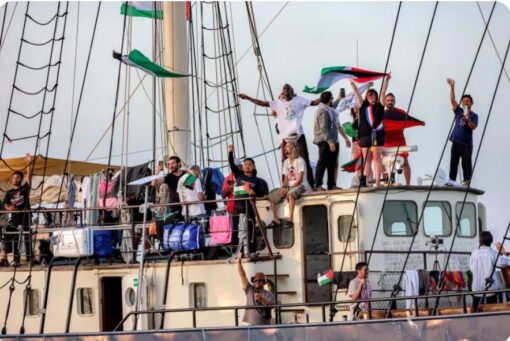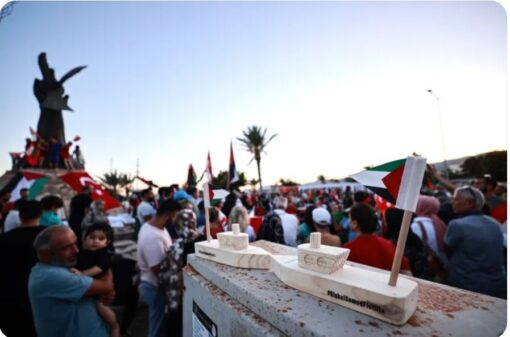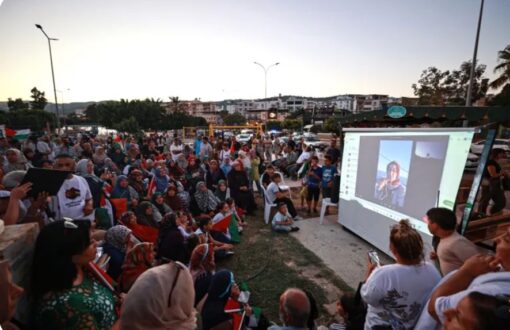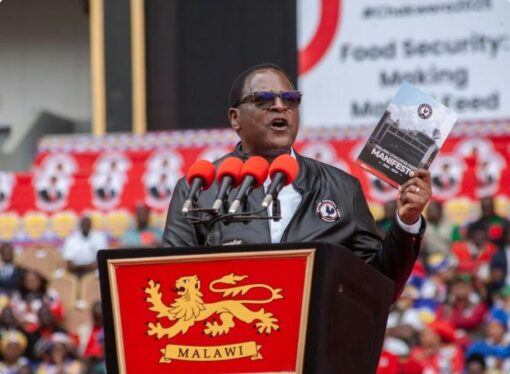The Global Sumud Flotilla, a convoy of more than 40 civilian vessels sailing toward Gaza with humanitarian aid, came under repeated drone attacks and electronic interference overnight, activists and organizers reported Wednesday.
The fleet, carrying international volunteers, lawmakers, and aid workers, is seeking to break Israel’s naval blockade of Gaza, a siege described by rights groups as collective punishment.
“Multiple drones, unidentified objects dropped, communications jammed and explosions heard from a number of boats,” the flotilla’s organizers said in a statement released as dawn broke near the waters off Crete. “This is an alarmingly dangerous escalation.”
The Gaza flotilla mission has grown over the past weeks, with boats departing from Tunisia, Turkey, and Greece to converge into a single convoy.

Organizers say the aid includes medical supplies, food, and water purifiers—items desperately needed in Gaza where an intensifying war has left civilians with little access to hospitals, clean water, or shelter.
Explosions in the Night
Activists onboard reported hearing more than a dozen explosions as drones swooped low over their boats. “I counted ten blasts around us, and it looked like they were trying to tear through our sails,” Brazilian activist Thiago Ávila wrote in a social media update.
Video clips shared by participants showed flashes lighting up the night sky as drones buzzed overhead. One recording captured activists diving for cover when a device detonated near the Alma vessel, accompanied by what witnesses described as a “flashbang.” These are military-style stun grenades that unleash deafening noise and blinding light, designed to sow panic without causing mass casualties.
“The psychological impact is real,” said former US Army Ranger Greg Stoker, who is sailing with the convoy. “But this is also about optics. Israel wants to shift focus from the devastation in Gaza by attacking us in the middle of the sea. This is not about security—it’s about intimidation.”
No fatalities were reported, though several vessels sustained damage to sails and communications systems. Organizers said it was too early to assess the full extent until daylight allowed proper inspection.
Activists Call Attacks “War Crimes”
In a strongly worded appeal, flotilla organizers urged the United Nations to intervene. “The targeting of humanitarian ships in international waters violates international law and constitutes war crimes and crimes against humanity,” the Global Sumud Flotilla said. “We call upon the 80th United Nations General Assembly to urgently address these grave violations.”
French Member of the European Parliament Rima Hassan, who joined the flotilla in Tunisia, warned President Emmanuel Macron directly via social media: “Several dozen French nationals are present on board the flotilla! These attacks must stop!”
Hassan has long been an outspoken critic of Israel’s policies. She was previously detained and deported by Israeli forces after joining another aid mission earlier this year. “I am not deterred,” she said before boarding in Bizerte. “This is about solidarity with the people of Gaza who are trapped under siege.”
Irish actor Liam Cunningham, famous for his role in Game of Thrones, also condemned the attacks. “The world has to stop this criminal behavior in international waters,” he wrote online. “There are people from 44 different countries on this voyage. This is humanity standing up against barbarity.”
Israel Defends Its Blockade
Israel has vowed to stop the flotilla, accusing organizers of trying to “breach a lawful naval blockade” that it argues is necessary to prevent weapons from reaching Hamas. “Any unauthorized attempt to enter Gaza’s coastal waters will be intercepted,” the Israeli military said in a statement.

The blockade, first imposed in 2007, has been repeatedly criticized by the United Nations and humanitarian organizations. The International Committee of the Red Cross has declared it a violation of international humanitarian law.
Francesca Albanese, the UN special rapporteur on the occupied Palestinian territory, described the attacks on the convoy as “a matter demanding immediate international attention.” She warned that states ignoring such incidents are “complicit in perpetuating impunity.”
Echoes of the Mavi Marmara
The latest confrontation revives memories of the 2010 Mavi Marmara raid, when Israeli commandos stormed a Turkish aid ship bound for Gaza, killing ten activists. That deadly episode sparked international outrage, yet Israel faced little long-term accountability.
In Turkey this week, thousands gathered in the port city of Mersin to cheer on the new flotilla. Waving Palestinian and Turkish flags, demonstrators chanted, “Children are starving in Gaza” and “The people of Gaza are not alone.” Organizers of the rally invoked the Mavi Marmara victims, vowing that “their sacrifice will not be forgotten.”
“We salute the Sumud Flotilla,” said Turkish civil society leader Serkan Avci. “This is not only about aid—it is about defending international law and ending impunity.”
A Dangerous Journey
For the hundreds onboard, the risks were never in doubt. Many activists say they expected Israel to launch psychological operations, but the intensity of the drone strikes has rattled even seasoned campaigners.
“These tactics will not deter us,” said the flotilla in a statement. “Our resolve is stronger than ever. We are committed to breaking the illegal siege and delivering aid directly to Gaza.”
Supporters argue that the mission is as much symbolic as practical. While the aid is limited compared to Gaza’s immense needs, the voyage is meant to spotlight what South African President Cyril Ramaphosa recently called “Israel’s genocidal war.” Addressing the UN General Assembly, Ramaphosa said: “We must stand against the systematic destruction of Palestinian life. The world cannot look away.”
War in Gaza Rages On
As the flotilla sailed under drone harassment, the war in Gaza continued to escalate. Local hospitals reported at least 29 Palestinians killed in airstrikes early Wednesday, including 17 at a crowded market in central Gaza City. Illumination flares lit up the night sky as residents fled through rubble-strewn streets.
“Every day, the number of dead children grows,” said Dr. Samir Abu Nasser, a physician at al-Ahli Hospital. “The blockade not only traps us, it ensures that when bombs fall, we have no medicine, no electricity, no escape.”
Israel insists its offensive is aimed at Hamas fighters, but rights groups counter that entire neighborhoods are being leveled in collective punishment. The UN has warned of famine-like conditions and total collapse of Gaza’s health system.
International voices are multiplying in support of the flotilla. South American parliamentarians, African civil society coalitions, and European lawmakers have all issued statements demanding Israel halt attacks on humanitarian ships.

Greg Stoker, the former US soldier turned activist, put it bluntly: “We are sailing not just with food and medicine but with a message. If Israel can attack civilians in the middle of the sea and the world shrugs, then international law is meaningless.”
As dawn broke over the Mediterranean, the flotilla pressed on, battered but unbowed. Whether it reaches Gaza remains uncertain. But its voyage has already reignited global debate over Israel’s blockade and the price civilians are paying for it.
“The sea is open, the world is watching,” said Rima Hassan. “This mission is not only about Gaza. It is about our shared humanity.”
Read more news here


